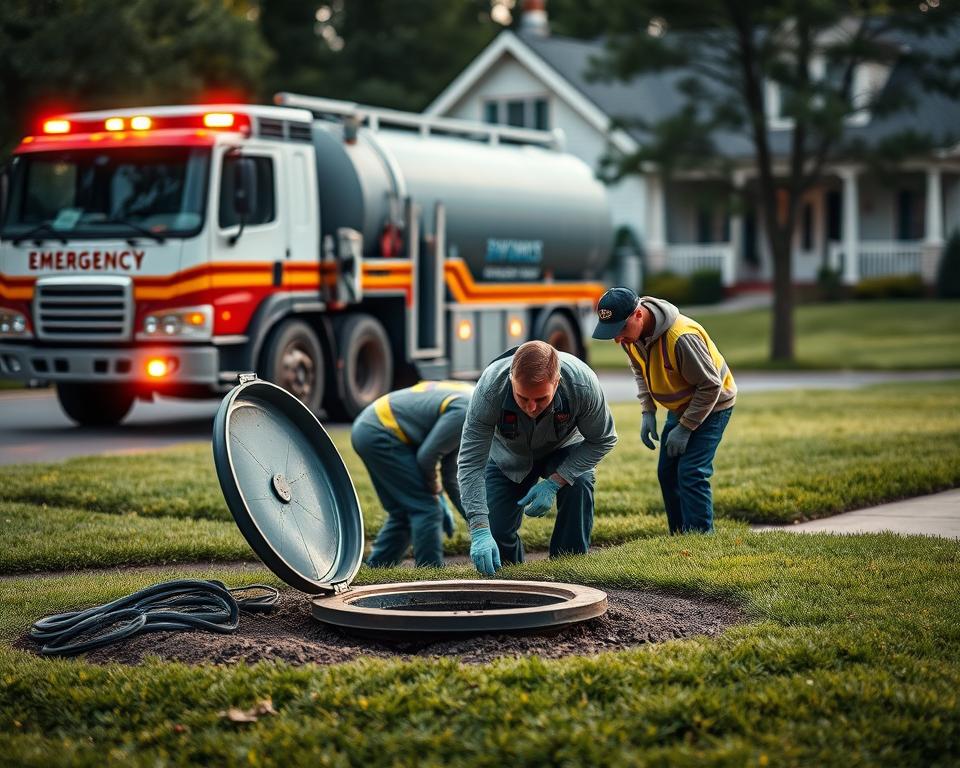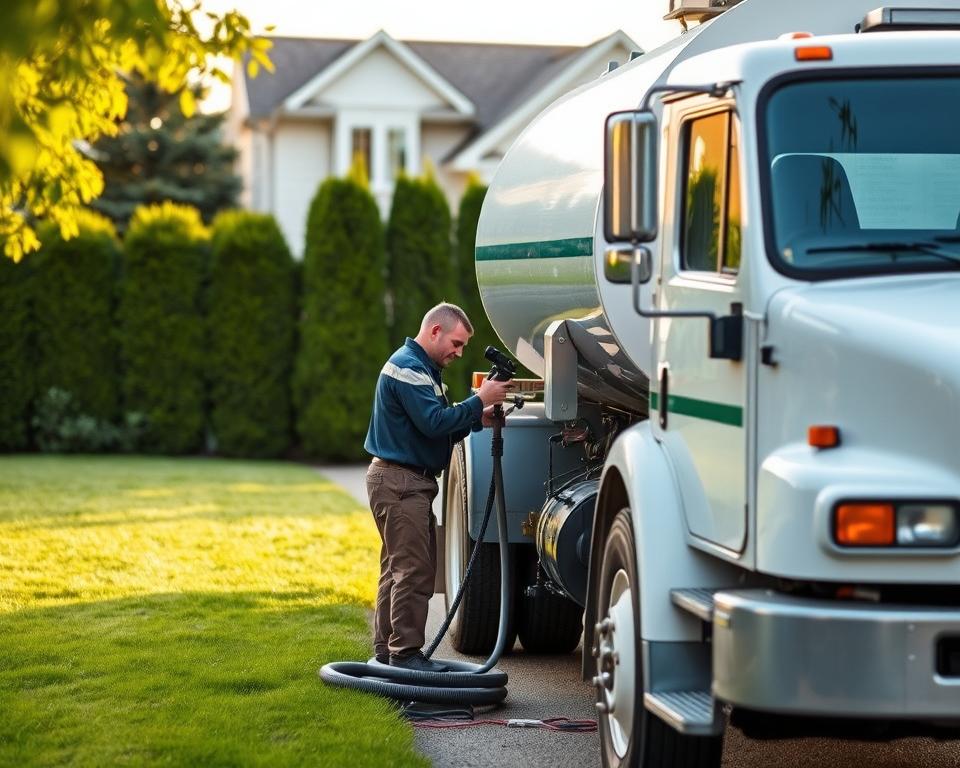Travel Trailer Septic Tank Pumping – Must-Read Guide
Have you thought about the consequences of disregarding your mobile unit’s septic system? For those possessing RVs and mobile units, it’s critical to grasp the importance of RV septic Tank Pumping. It maintains your road adventures are hassle-free and living conditions stay sanitary during every trip. By prioritizing regular RV septic service, this manual seeks to make you ready in maintaining your septic system, sidestepping potential headaches — notably when enjoying the great outdoors.
In this article, comprehensive guidance into picking solid mobile septic services is provided. What’s more, discover to detect when your septic Tank requires urgent attention. Understanding the process for streamlined RV septic Tank Pumping rounds things out. Rather than reacting to issues as they pop up, enable this guide to supply you with essential knowledge. This sets up your RV experiences keep carefree!
The Importance of Routine RV Septic Tank Pumping
Consistent care of your camper’s septic Tank is paramount for its wastewater system’s functionality. Ignoring this can result in clogs and backups, spoiling your enjoyment and impacting the environment. Sewage leaks from an full Tank can taint the area, creating major concerns.
Choosing professional Pumping services like All-In Sanitation makes sense for RV owners. This action stops issues and extends your system’s functionality and longevity. Proper Pump-outs translate to a healthier, safer environment in RV parks and campgrounds.
Understanding Your Travel Trailer’s Septic System
A motorhome septic system consists of three primary elements: the black water Tank, grey water Tank, and fresh water Tank. For RV owners, it’s critical to know these parts. They are fundamental in waste management. The black water Tank contains toilet sewage, while the grey water Tank receives water from sinks and showers.
Each Tank has a separate role in keeping the trailer healthy and operational. Checking the levels in the black water and grey water Tanks is important. It staves off overflows, bad smells, and damage to the septic system.
For a clearer understanding, below is a table that highlights differences between the black water and grey water Tanks:
| Feature | Black Water Tank | Grey Water Tank |
|---|---|---|
| Purpose | Stores sewage waste | Collects wastewater from sinks and showers |
| Maintenance Frequency | Requires scheduled Pumping | Needs less frequent emptying |
| Potential Issues | Odors, blockages from solids | Risk of grease buildup |
| Typical Size | Generally bigger than grey water Tank | Smaller than black water Tank typically |
Understanding your trailer’s septic system is cornerstone for maintenance. It guarantees hassle-free travel experiences. Staying mindful of both Tanks means trips with zero septic concerns.

Signs Your Septic Tank Needs Pumping
It’s important to know when your septic Tank needs Pumping to protect your system efficient. Detecting issues early can help avoid major repairs and environmental harm. Key signs that demand attention include:
- Slow draining sinks, which may signal a full Tank or clog.
- Gurgling toilets, suggesting blocked pipes or a failing septic system.
- Foul odors around your RV, an early warning of rising sewage.
- Pooling water near the drain field, suggesting that your Tank may be overwhelmed.
- Sewage backups in your toilets or drains, a sure sign prompt action is needed.
Staying alert of these signs empowers RV owners to respond quickly, preventing grave issues. Keeping tabs on your system and responding to these indicators can lengthen your septic system’s lifespan. This approach leads to a smoother trailer experience.
Variables Impacting Pumping Frequency
A septic Tank’s volume greatly determines how often it demands Pumping. Larger Tanks demand fewer service because they contain more waste, whereas smaller Tanks demand closer-interval Pumping.
The fleet size using the septic system also impacts Pumping frequency. With more RVs, the system experiences heavier strain, necessitating more frequent Pumping. Particularly in peak seasons, tweaking the schedule is important to avoid problems.
Here is a table that highlights recommended Pumping intervals based on typical scenarios:
| Septic Tank Size | Number of RVs | Recommended Pumping Frequency |
|---|---|---|
| 500 gallons | 1-2 RVs | Every 2-3 years |
| 1000 gallons | 2-4 RVs | Every 3-5 years |
| 1500 gallons | 4+ RVs | Every 1-2 years |
Thoughtfully determining your septic Tank’s Pumping frequency boosts its operation. It also prolongs its life and effectiveness. This choice is vital for maintaining system health.
How to Choose a Reliable Septic Pumping Service
Choosing a reliable septic Pumping service is essential for your trailer’s septic system health. It secures swift and effective Pumping, preventing pricey future repairs. When searching for a septic service provider, consider these critical aspects:
- Experience: Search for companies with a proven track record. Their experience with various septic systems, especially those for trailers, is paramount.
- Customer Reviews: Read online reviews and testimonials. Positive feedback and strong ratings are signs of a dependable provider.
- Response Time: Rapid response times signal a company’s dedication to their customers and willingness to meet their needs efficiently.
- Knowledge of Systems: Exceptional knowledge of RV septic systems distinguishes some services. Providers like All-In Sanitation understand these systems well, enabling customized service.
Prioritize these considerations to secure the most appropriate service for your septic requirements. A trustworthy septic Pumping service extends your system’s life and performance, allowing for carefree travel adventures.
Trailer Septic Tank Pumping: The Process Explained
Trailer septic Tank Pumping follows important steps for efficiency and safety. It’s vital for RV owners to know this process before service appointments.
A technician with a trailer-mounted Pump shows up first, suited for mobile systems. This technology facilitates effective waste removal while safeguarding the environment. They connect the Pump to the rig’s system with a hose reaching the Tank.
The Pump then extracts the waste out of the Tank. This action is essential to preserve the septic system sound and prevent overflow. After emptying, the technician assesses the Tank for damage or wear, ensuring proper function.
Following the Pump-out, waste disposal is the next step. The hauled waste is taken to treatment facilities for safe processing. This step limits environmental harm.
The process profits from the trailer-mounted Pump’s speed. Scheduled service cuts time and cost, keeping the septic system in prime condition.
Urgent Septic Pumping Services
Sudden issues with your septic system can call for instant intervention. For RV enthusiasts, understanding when to get emergency septic Pumping is vital to avoid further damage and exorbitant costs. Situations calling for prompt septic Tank Pumping include backups, unpleasant smells, and sewage leaks. Swiftly addressing these issues often requires septic Tank Pump and haul services to effectively remove waste and restore system functionality.
Providers like All in Sanitation provide 24/7 emergency septic Pumping, assuring help is immediately available when urgently needed. Taking initiative with these services significantly boosts your septic system’s lifespan and performance. Having a trusted septic service readily accessible can mitigate expenses and stress in emergencies, delivering uninterrupted enjoyment of RV adventures.
Pointers for Caring for Your RV Septic System
Keeping your motorhome’s septic system in top shape is crucial. Proper maintenance strategies can sidestep expensive problems later. Begin by regular checks for damage, leaks, or strange smells for RV septic Tank care.
Sensible waste disposal is central for a healthy system. Do not flush items that won’t break down, and opt for septic-friendly products. It’s critical that everyone understands how their actions impact the septic system. This makes certain it is kept functional and efficient.
- Carry out periodic checks for leaks and unusual odors.
- Communicate regularly with your septic service provider for prompt maintenance.
- Utilize septic-safe toilet paper and cleaning supplies.
- Refrain from pouring chemicals down the drain that could damage the balance of bacteria in the Tank.
- Plan for regular professional inspections to catch potential issues early.
Following these steps enables RV owners lengthen their RV septic systems’ life and performance.
Frequent Challenges with RV Septic Systems
Trailer septic systems often experience hurdles that annoy RV owners. Solve these issues early to sidestep bigger problems later. Clogs in septic Tanks are frequent, mainly due to not disposing of waste properly. To prevent clogs, use RV-safe toilet paper and do regular maintenance.
Another significant issue is odor control. Bad smells can indicate backups or leaks, needing immediate action. To minimize odors, make sure the system is properly vented and the septic Tank is emptied regularly.
Leaks can appear from wear or incorrect installations. Quick identification of leaks aids stopping environmental damage and maintains the system working. Routine inspections are important to spot these issues early.
To avoid common issues, follow preventative strategies like scheduled maintenance and proper waste disposal. Knowledgeable and proactive RV owners can relish their travels stress-free and with peace of mind.
The Final Word
Being savvy about trailer septic Tank Pumping is key for RV and trailer owners. Routine maintenance and noticing trouble signs in your septic system can elevate* your RVing experience immensely. Managing your RV’s septic system well ensures both safety and comfort during your outdoor adventures.
Selecting a dependable service for your camper’s septic Tank Pumping is critical. Engaging experts like All in Sanitation ensures your mobile waste management is top-notch. This approach is not just environmentally sound, but it also enhances the camping experience, making it more enjoyable and sustainable.
Consistently maintaining your septic system reduces emergencies, improving your nature stays. Proper care and understanding empower memorable trips for the best reasons.


